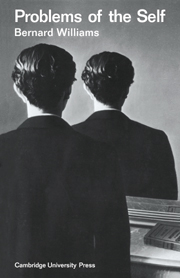Book contents
- Frontmatter
- Contents
- Dedication
- Preface
- 1 Personal identity and individuation
- 2 Bodily continuity and personal identity
- 3 Imagination and the self
- 4 The self and the future
- 5 Are persons bodies?
- 6 The Makropulos case: reflections on the tedium of immortality
- 7 Strawson on individuals
- 8 Knowledge and meaning in the philosophy of mind
- 9 Deciding to believe
- 10 Imperative inference
- 11 Ethical consistency
- 12 Consistency and realism
- 13 Morality and the emotions
- 14 The idea of equality
- 15 Egoism and altruism
- Bibliography
- Index of names
7 - Strawson on individuals
Published online by Cambridge University Press: 07 December 2009
- Frontmatter
- Contents
- Dedication
- Preface
- 1 Personal identity and individuation
- 2 Bodily continuity and personal identity
- 3 Imagination and the self
- 4 The self and the future
- 5 Are persons bodies?
- 6 The Makropulos case: reflections on the tedium of immortality
- 7 Strawson on individuals
- 8 Knowledge and meaning in the philosophy of mind
- 9 Deciding to believe
- 10 Imperative inference
- 11 Ethical consistency
- 12 Consistency and realism
- 13 Morality and the emotions
- 14 The idea of equality
- 15 Egoism and altruism
- Bibliography
- Index of names
Summary
P. F. Strawson's book Individuals is subtitled An Essay in Descriptive Metaphysics, ‘Descriptive metaphysics’, he writes (p. 9), ‘is content to describe the actual structure of our thought about the world’, whereas ‘revisonary metaphysics is concerned to produce a better structure’; it is distinguished from logical or conceptual analysis in scope and generality, rather than in fundamental intention. The book is divided into two parts; in Strawson's words (pp. 11–12), ‘the first part aims at establishing the central position which material bodies and persons occupy among particulars in general… In the second part of the book the aim is to establish and explain the connexion between the idea of a particular in general and that of an object of reference or logical subject.’
In the first part, Strawson introduces the notion of identification, and gives an account of the identification of particulars and the rôle played in this, in our actual thought, by material bodies (Ch. 1). He then considers the possibilities of identification in a hypothetical world containing no material bodies, but only sounds (Ch. 2). In the third chapter, he discusses persons, and in the fourth offers some engaging and largely self-contained Leibnizian reflections (‘Monads’). The second part starts with a long discussion of subject and predicate, in which various criteria for the distinction are considered.
- Type
- Chapter
- Information
- Problems of the SelfPhilosophical Papers 1956–1972, pp. 101 - 126Publisher: Cambridge University PressPrint publication year: 1973



